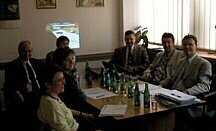 |
| Co-operation remains the key to successful water management - a German/French/Hungarian team at work |
Many of the tasks required by the Water Framework Directive, such as the
elaboration of significant criteria, typology, the setting of reference
conditions and the development of assessment systems have not previously
been addressed by water authorities in DRB countries. The WDF therefore
cannot be applied in the Basin without some preparation activities.
In the beginning of 2002 Hungary asked the EU member states for assistance
with the implementation of the WFD by publishing a fiche for an EU twinning
project. A German/French consortium was authorised to provide the assistance
and the project got under way in November 2002.
The overall objective of the project is to assist Hungary in aligning its
national laws, rules and procedures to allow for the implementation of the
WFD, and to ensure full institutional capacity in fulfilling the planning,
regulation, reporting and information requirements set by the Directive.
In the course of the project, the Hungarian Ministry of the Environment
and Water will be supported in the enforcement and implementation through
the development of a national accidental water pollution control system
under the guidance of pre-accession advisor Pierre Henry de Villeneuve,
villeneuve@mail7.ktm.hu and the development of a surface and groundwater
monitoring system under the guidance of pre-accession advisor Stephan von
Keitz.
The objectives of the accidental water pollution control system are to:
• create instructions for appropriate measures for the prevention of
accidental water pollution;
• design a model watershed contingency plan, consistent with the WFD,
on a pilot case study of a catchment area shared with a neighbouring country;
• improve the efficiency and rapidity of interventions in the case
of accidental water pollution, and
• introduce new response techniques in Hungary.
The objective of the environmental monitoring system is to assess the environmental
situation and to enable the administration to define where adequate measures
have to be planned in order to achieve the quality standards of the objective.
This includes:
• assistance in the development of a typology for Hungarian surface
waters;
• definition of reference conditions and reference sites;
• the identification of significant surface and groundwater bodies,
and
• the development of procedures for surface and groundwater assessment
systems including biological assessment.
These activities will be executed in close cooperation with the Hungarian
administration. The ICPDR Secretariat participates directly through the
work of an expert.